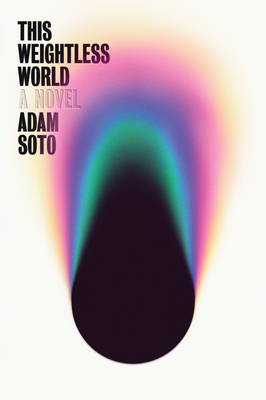- The Good: Empathetic characters trying to help after alien contact; an AI that “saves” humanity
- The Bad: Light on plot and scifi
- The Literary: Multiple POVs, alternating timelines; Italo Calvino, The Grapes of Wrath, Les Miserables, and many more that comment on the human situation
SETI begins to receive a message from Omni-7xc, a planet 75 light years away, confirming extraterrestrial life. As the news unfolds, Sevi, a high school music teacher, answers the phone when his on-again, off-again computer-programmer girlfriend Ramona calls, and they pick up their relationship where they left off. The school where Sevi teaches closes, and his favorite music student struggles to find his place in the world.
This Weightless World sounds like scifi, but it’s more interested in exploring the struggles of humanity. Once I accepted this story as more literary than scifi and settled into the sad intellectual monologues about how we humans are mostly terrible, I enjoyed this one a lot more. So since you know the themes are much bigger than the plot, I’ll spoil a little. The signal from space is constant, and as scientists begin to decode it humanity’s infighting stops as we begin to turn our perspectives outward. Things seem optimistic. Then, the signal abruptly stops, and we fall back into our old patterns.
Nearly all the characters revolve around Sevi, each with their own cares and motivations, all of whom really come to life. Sevi, the burned-out music teacher who regrets many of his life decisions, is primarily looking for a small slice of happiness and connection by trying to make it work with Ramona. Ramona works long hours coding on a special AI program at Google, one that’s designed to steer users to make decisions based on what the AI deems necessary for human survival. The only student with whom Sevi remains in contact after the high school closes is Eason, a young man who wrestles with the choice of selling drugs to help a friend or trying to leave his neighborhood and pursue classical music. Then there’s Sevi’s brother, Samson, who neglects all his relationships to follow the next humanitarian crusade, this time to Syria. There are two more POV characters, one in the past, and one in the future, who provide wonderful bookends, but I’ll let you experience those for yourself.
Everybody in this story is trying their best to make the world a better place in their own way, often disagreeing on the best path forward. But what they all have in common with each other and the reader is that they all hit an empathy wall. The world is too big and they can only do so much, and I’d argue, are forgiven by the reader.
As the world moves around him, Sevi notes and comments on gentrification, cops shooting black people, the coral reefs dying, separating art from the artist, aging parents, music as powerful as medicine or language, being the only brown person in your friend group, and consciousness as self, to name a few. But most importantly, this book reinforces the idea that we love to think that something will come along at the perfect time to solve all of the problems we ourselves created.
Highly recommended for idealistic and compassionate readers who enjoy scifi and fantasy that reflects on the nature of human empathy surrounding a world-changing event. See Cloud Atlas, 1Q84, Contact, and Station Eleven.
